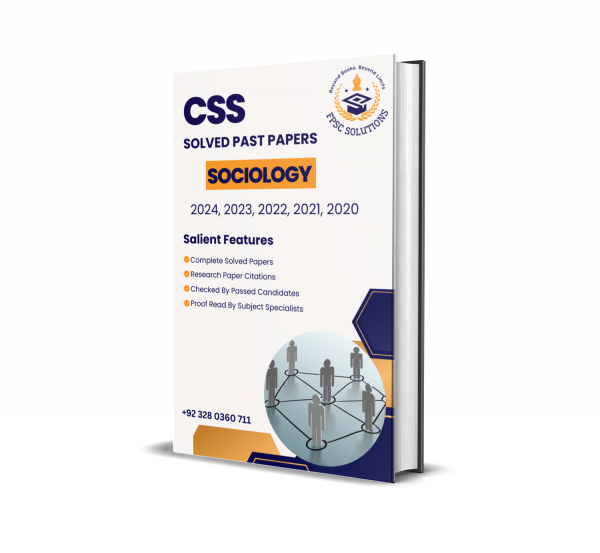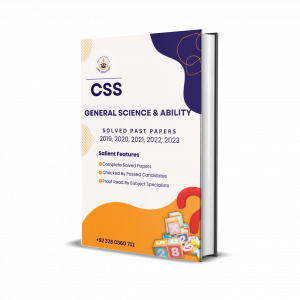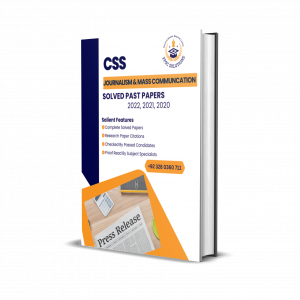CSS Sociology Past Paper 2024
Q2. Discuss the intricate relationship between culture and socialization, highlighting key mechanisms through which the cultural elements are internalized by the individuals in a society. Give examples to illustrate your answer.
Q3. The individuals are the limbs of the society and behave as the cells of the body”. Discuss this statement with the help of organismic theory in sociology. Explain how this theory helps in addressing the profound question of relationship between individual and society?
Q4. Applying functionalist perspective, discuss the interdependence of social institutions and their role in maintaining social equilibrium in society. Give examples from Pakistani society to elaborate your answer.
Q5. What is social control? How do social control mechanisms help to maintain social der and create a harmonized society? What are the consequences of labeling an individual as deviant through the social control mechanisms?
Q6. Discuss “verstehen” in the context of interpretive approach in social sciences. How the concept of verstehen shaped Max Weber’s understanding to gain knowledge about society and the social actors?
Q7. Discuss the key components of research design in quantitative research, including research questions and hypothesis, variables, theoretical framework, sampling, data collection methods and tools, and data analysis techniques. How do these elements contribute towards conducting a well-organized quantitative research study?
Q7. Write notes on the following: (10 each)
- Survey Research
- Postmodern Theory
CSS Sociology Past Paper 2023
The following questions are given in the Sociology Paper 2023:
Q2. Education is an important social institution. How do conflict and functionalist perspectives view education as an institutionalized activity? which of these approaches can be, describe the system of education in Pakistan and how?
Q3. Explain G. H. Mead’s Concepts of Mind. Self and Society along with the basic principles of Symbolic Interactionism.
Q4. What is ontology, and epistemology methodology? What is the role of ontology and epistemology in social research?
Q5. How do time series, panel, and cohort studies differ? What are some potential problems with cost-benefit analysis?
Q6. Discuss in detail the theory of justice and Plato’s theory of forms and allegory of the cave.
Q7. What is meant by Society? Discuss its types in detail. Also, define culture and what is the difference between material and non-material in social culture.
Q8. Write notes on the following:
- Conversation Analysis
- Volcano of civilization
CSS Sociology Past Paper 2022
Q2. Deviant Behaviour is the result of ineffective social control. Comment on the flaws existing in the formal and informal mechanisms of social control with examples and add how these mechanisms can be improved.
Q3. Since the inception of Pakistan as an independent country, numerous education policies have been developed but have not stood productive towards ensuring hundred percent enrolment. Describe the systemic flaws and other restraining forces behind it.
Q4. Compare Ibn-e-Khaldun’s Asabiya and Durkheim’s social solidarity on the basis of consonance and dissonance in the major premises of their theories.
Q5. Social issues are investigated through quantitative and qualitative modes of inquiry in variable situations. Explain the different situations with examples, reflecting the proper application of the two methods.
Q6. How can sexually abused children be reintegrated into society? Highlight the role of formal and informal agents/organizations in the socio-cultural landscape of Pakistan.
Q7. Max Weber and Talcott Parsons have theorized social action from their variable perspectives. Highlight the contributions of both thinkers and also locate the divergence in their standpoints.
Q8. Write notes on the following:
- Social functions of religion
- Cultural Relativism
CSS Sociology Past Paper 2021
Q2. Many scholars argue that the contemporary world we live in is predominantly dominated by global culture. Do you agree that we live in a society with a global culture, provide examples for your arguments?
Q3. In what ways does informal and formal social control help to reduce or prevent deviance and crime in society?
Q4. In what ways have industrialization and the tertiary sector created socio-cultural change in Pakistan?
Q5. Do you think Marxist theory about class and gender-based conflict is still relevant in contemporary days?
Q6. Discuss why Ibn-e-Khaldun, a 14th-century Islamic jurist and scholar, still influences thinkers and sociologists even today, with respect to his ideas about social change?
Q7. Discuss the strengths and limitations of the three methods of data collection for social researchers: qualitative, quantitative, and mixed methods.
Q8. Write Notes on the following:- (10 each)
(a) The social determinants that contribute to workplace violence against women in Pakistan
(b) The social determinants that contribute to domestic violence against women in Pakistan
CSS Sociology Past Paper 2020
Q. No. 2. Differentiate between social change and social structural changes. Discuss three key areas which need immediate attention of policy makers. (20)
Q. No. 3. Durkheim emphasized on the functional aspects of religion. However, we observe many instances of religious extremism in Pakistani society. Shed some light on the phenomenon. (20)
Q. No. 4. Do you think Karl Marx’s capitalist perspective is applicable to today’s world? Elaborate your answer by giving arguments. (20)
Q. No. 5. Max Weber used the term Verstehen for better understanding of social actions. Explain the significance of the concept by discussing two examples from social life. (20)
Q. No. 6. How can moral degeneration be scientifically studied? Delineate the entire research process for studying this phenomenon. (20)
Q. No. 7. Differentiate between qualitative and quantitative way of studying any social phenomenon. Elaborate by giving an example of each approach and how that can be inquired? (20)
Q. No. 8. Write Notes on the following:- (10 each)
(a) Types of society
(b) Caste and Class Dynamics in Pakistan






Reviews
There are no reviews yet.